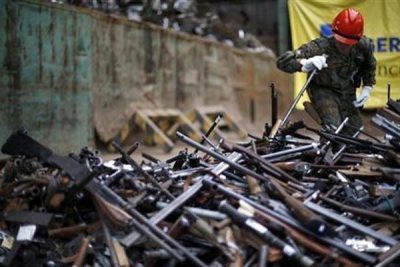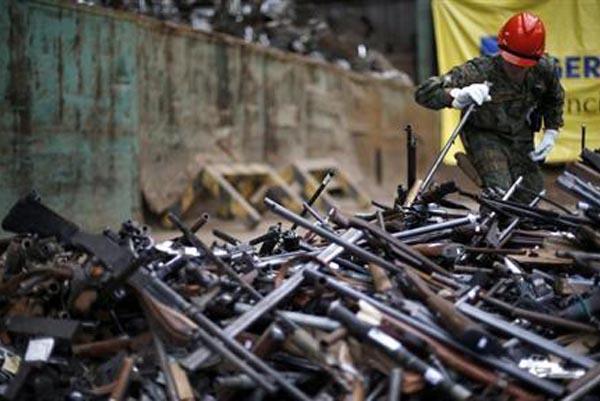 Last April, after six years of negotiations and more than 10 years of campaigning by civil society, the international Arms Trade Treaty (ATT) passed to “resounding applause and loud cheers” in the United Nations General Assembly Hall. Two months later, on June 3, the treaty opened for signature by the 193 member states. Over 60 countries signed the ATT that very day, with the United States—the world’s largest arms exporter—expected to follow suit soon.
Last April, after six years of negotiations and more than 10 years of campaigning by civil society, the international Arms Trade Treaty (ATT) passed to “resounding applause and loud cheers” in the United Nations General Assembly Hall. Two months later, on June 3, the treaty opened for signature by the 193 member states. Over 60 countries signed the ATT that very day, with the United States—the world’s largest arms exporter—expected to follow suit soon.
Critics of the ATT have lampooned the agreement’s relatively meager reporting requirements and evident lack of an enforcement mechanism. But for all its weaknesses, the treaty deserves to be celebrated. One person dies every minute as a result of armed violence, and the ATT makes significant progress towards combating this problem.
Among other things, the treaty…
1) Puts the Arms Trade on the International Agenda
The agreement of the Arms Trade Treaty sends a clear message to arms dealers who supply war lords and dictators that their time is up. They will no longer be able to operate and arm themselves with impunity. The world will be watching and will hold them accountable. –Anna MacDonald, Oxfam
For the first time in history, the $70-billion global arms trade will be regulated by international law. When the Control Arms movement was first launched, only three countries—Mali, Costa Rica, and Cambodia—were willing to publicly call for the treaty. The treaty has come a long way since then, with the final version passing by a vote of 153-4.
A key component to successfully moving an issue away from mere talk to substantial negotiation is to raise public awareness. Too often there is an enormous disconnect between the general public—the people these international agreements are supposed to protect—and the state delegations drafting the treaty. Since former Costa Rican president Oscar Arias brought together a group of Nobel laureates to draft an International Code of Conduct for Arms Transfers, civil society has been an active participant in the ATT drafting process. Through their access to negotiations, civil society activists were able to ensure that the entire drafting process received extensive media coverage. This attention helped to ensure that the arms issue did not disappear like so many calls for international action before it.
Further, as General Secretary Ban Ki Moon notes, the coalitions built between states and on-the-ground entities working to combat the violence caused by the arms trade during the ATT negotiations may even “provide much-needed momentum for other global disarmament and non-proliferation efforts.”
2) Increases the Transparency of Arms Transfers
At last, the murky world of arms dealing has come under the spotlight of the international community. –Allison Pytlak, Control Arms
Many critics of the ATT have complained that the agreement’s reporting requirements are far too weak to have any effect in combating the global arms trade. It is true that the primary reporting responsibility still falls on states and that the treaty does not establish any over-arching monitoring body.
However, what it does accomplish is to take the arms transfer process, something previously relegated to the shadows, to the forefront of discussion. As the delegation of Japan emphasized in its speech during the vote in the UN General Assembly “of particular importance in the treaty [are] transparency and accountability measures.” State parties are required to annually submit to the Secretariat the exports and imports of conventional arms that they have made during that year.
3) Serves as a Common International Standard
The Treaty adopted today will establish a common international standard for the national regulation of the international trade in conventional arms and require all states to develop and implement the kind of systems that the United States already has in place. –John Kerry, U.S. Secretary of State
As the delegation for Japan stated, “with the adoption of the ATT we now have a solid basis to assess whether states are being responsible in conducting arms transfers.” Both exporting and importing states now have a common standard to hold each other accountable.
It’s true that the vague nature of this standard, combined with the lack of a strong enforcement mechanism, could allow many signatories to shirk their responsibilities. However, the inclusion of transparent reporting measures can help to ensure that the ATT’s provisions are followed.
Before it was only up to governments to police the arms trade, but now ordinary citizens can respond. The ATT opens the door for civil society to serve as a monitoring force. Activists now have a tool to monitor and pressure states that are not tracking or exposing illicit arms deals.
4) Still Allows for the Legitimate Transfers of Arms
The ATT encourages professional behavior so governments can legitimately purchase arms. —Adotei Akwei, Amnesty International
Despite the nefarious nature of many international arms transfers, states often do have legitimate national security interests in purchasing weapons from their international partners. That is why it is so important that legitimate transfers of arms are still allowed to occur within the parameters of the ATT.
This condition allows states to counter complaints from domestic organizations that have lobbied hard to keep their prospective states from signing the ATT. For example, NRA pressure on the U.S. government was partially responsible for stalling the previous round of negotiations in July 2012.
Thomas Countryman, assistant secretary for international security and nonproliferation at the U.S. State Department, emphasized in a talk at the Stimson Center that in no way does “this treaty touch the constitutional rights under the 2nd amendment” for Americans to possess or sell small arms within their own borders. Organizations like the NRA, Countryman says, “have crossed the line from passionate advocacy to misinterpretation” by suggesting anything to the contrary.
5) Serves as a Starting Point
Even with the consensus process this is far beyond what we expected…even though the criteria do not line up with the Arias Code of Conduct, or the original Amnesty International proposal. –Rachel Stohl, Stimson Center
The final version of the ATT is far from perfect. Ammunition is still poorly regulated, and a long list of weapons has been left out the treaty altogether. There is also no mention of how to regulate arms and weapons that are gifted rather than sold, so one country could present another country with billions of dollars worth of arms without violating the provisions of the ATT.
Still as noted by the delegation from Cote d’Ivoire, “this is a first step, but a decisive and significant one.” Not only is the ATT an important first step, but also there are many steps that can be taken after the ATT enters into force to further strengthen its implementation.
And as suggested by the delegation of Japan, “in order to better implement the treaty, each state can do more than what is prescribed.” The ATT includes both international cooperation and assistance provisions that will make this goal easier to accomplish.
Besides striving for better implementation language, the treaty leaves open the possibility that beneficial changes can be made within the treaty itself. Amendments no longer have to pass by consensus, but instead only require a three-fourths majority of state parties.
The final draft of the ATT contains significant improvements over the draft version from July 2012, including the provision of regulations for ammunition and weapons components alongside fully assembled weapons themselves. These two provisions are extremely necessary and important if the ATT hopes to effectively address the violence caused by small arms. With additional time, more beneficial amendments can pass—and perhaps all-new treaties.
The drafting process of the ATT included a diverse group of stakeholders, which may have led to a treaty that was more watered down than the one envisioned by its proponents in civil society. But if the ATT is to be effective, it requires a large consensus group; even a strong treaty is useless if states won’t enforce it.
Several of the world’s top exporters—including the United Kingdom, France, Brazil, and Mexico have signed the ATT. U.S. Secretary of State John Kerry has stated that the United States will soon sign the document and is merely waiting for the various translations into the United Nations’ six official languages to be finalized. For all the benefits described above to be realized, it is imperative that key exporters like Russia and China and major importers like India, Saudi Arabia, Indonesia, and Egypt join the international movement and sign the ATT.
